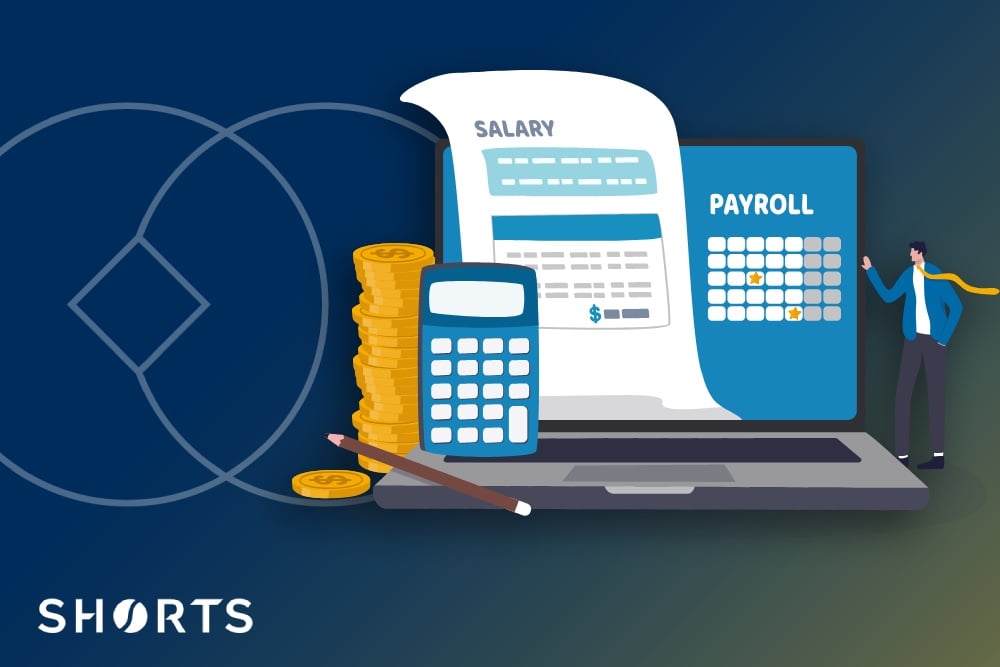
Understanding UK salary deductions is key to staying compliant and supporting your team. This quick guide will walk you through the essentials, helping you feel more confident about what needs to be deducted from your employees’ pay and why.
Salary deductions refer to the amount of money subtracted from an employee's earnings before they receive their final payslip.
These deductions can be statutory or voluntary, depending on the circumstances. Statutory deductions are mandatory and required by law for people who meet certain criteria, while voluntary deductions are agreed upon between the employer and employee.
This guide summarises the main salary deductions in the UK, including what they are and who might be subject to them.
Tax deductions
Tax deductions are one of the most common types of deductions from an employee's salary. In the UK, the amount of income tax deducted from an employee's earnings is determined by their tax code, which takes into account their tax-free allowance and any additional factors such as benefits or pensions.
Income tax rates for 2024/25
|
Band of taxable income |
Rate |
Rate if dividends |
|
|---|---|---|---|
|
£ |
% |
% |
|
|
0 - 37,700 |
Basic rate |
20 |
8.75 |
|
37,701 - 125,140 |
Higher rate |
40 |
33.75 |
|
Over 125,140 |
Additional rate |
45 |
39.35 |
|
Special rates for savings and dividend income falling into above bands of taxable income |
|||
|
Savings Allowance |
|||
|
Basic rate taxpayers |
1,000 |
0 |
|
|
Higher rate taxpayers |
500 |
0 |
|
|
Additional rate taxpayers |
Nil |
N/A |
|
|
Dividend Allowance |
|||
|
for all taxpayers |
500 |
0 |
|
Income tax allowances for 2024/25
|
Income tax personal allowances |
£ |
|
Personal Allowance |
12,570 |
|
Marriage Allowance |
1,260 |
|
Blind person's allowance |
3,070 |
|
Married couple's allowance Either partner born before 6 April 1935 |
|
|
- Maximum reduction in tax bill |
1,108 |
|
- Minimum reduction in tax bill |
428 |
|
Married couple's allowance income limit Reduce married couple's allowance by £1 for every £2 of 'adjusted net income' above this limit |
37,000 |
National Insurance Contributions
National Insurance Contributions (or NICs) are another mandatory deduction. These contributions help fund various state benefits, including the state pension, healthcare, and unemployment benefits. The amount of National Insurance contributions deducted depends on the employee's earnings and their National Insurance category.
- Employees start paying Class 1 NIC from age 16 (if sufficient earnings).
- Employers pay Class 1 NIC in accordance with the table below.
- Employer NIC for employees under the age of 21 and apprentices under the age of 25 is reduced from the normal rate to 0% up to the Upper Secondary Threshold of £967 per week. Also applies to veterans in the first 12 months of employment.
- Employees’ Class 1 NIC stop when they reach their State Pension age. The employer’s contribution continues.
Employees – Class 1
| 2024-25 | 2023-24 | |
| Earnings per week | % | % |
| Up to £242* | Nil | Nil |
| £242.01 – £967 | 8 | 12 up to 5 Jan 2024 |
| 10 from 6 Jan 2024 | ||
| Over £967 | 2 | 2 |
Entitlement to state pension and other contribution-based benefits is retained for earnings between £123 and £242 per week.
Employers – Class 1
| 2024-25 | 2023-24 | |
| Earnings per week | % | % |
| Up to £175 | Nil | Nil |
| Over £175 | 13.8 | 13.8 |
Pension contributions
Pension contributions are deductions made from an employee's salary to fund their pension scheme. Employers are required to enrol eligible employees into a workplace pension scheme and deduct a percentage of their earnings towards their pension. Employees also have the option to make additional voluntary contributions to further boost their pension savings.
Student loan repayments
For employees who have taken out a student loan to fund their higher education, deductions for student loan repayments are made from their salary. The amount deducted depends on the employee's income and their student loan repayment plan. Each repayment plan has its own repayment threshold and percentage rate.
The employer is responsible for deducting the correct amount from the employee’s salary based on their repayment plan and forwarding it to the Student Loans Company. Employees should be informed about their plan type and repayment terms to ensure they can manage their finances effectively.
Union membership fees
If an employee is a trade union member, their membership fee may be deducted directly from their salary. This deduction is typically authorised by the employee through a payroll deduction agreement with the employer.
Voluntary deductions
Voluntary deductions are deductions agreed upon between the employer and employee. These can include contributions to charitable organisations, such as regular donations to support local communities or international causes. Many employers offer payroll giving schemes, which enable employees to contribute to their chosen charities directly from their salary.
Additionally, voluntary deductions might include gift programs for other employees, which could include contributions to a colleague's retirement fund, a collective gift for a co-worker's milestone celebration, or support for an employee-facing hardship.
Employers may also provide options for employees to allocate a portion of their salary towards workplace initiatives or social funds. By offering these voluntary deductions, employers can enhance employee engagement, promote a culture of giving, and support employee wellbeing.
Deductions for employee benefits
Certain employee benefits, such as health insurance or gym memberships, may require deductions from the employee's salary in order to cover or partially subsidise the cost of these benefits to the employer.
Deductions for absences
When an employee is absent from work, there may be deductions from their salary depending upon the circumstances involved. These can include deductions for sick leave, unpaid leave, or other types of authorised or unplanned absences. It is very important for employers to have clear policies in place regarding salary deductions for absences to ensure consistency and fairness for the team.
Other salary deductions
The deductions listed above will likely be familiar to many salaried employees in the UK; however, there are several less common salary deductions which may be required under specific circumstances. These salary deductions include the following.
Court-ordered deductions
In some cases, court orders may require employers to deduct money from an employee's salary. This can include deductions for legal obligations specified by the court.
Employees who have child maintenance obligations may have deductions made from their salary to fulfil these responsibilities. In such instances, the amount deducted will usually be determined by the Government’s Child Maintenance Service, or a court order
Deductions to correct overpaid wages
If an employee has been overpaid due to an administrative error, employers may deduct the excess amount from future salary payments. This process, often referred to as a salary overpayment recovery, ensures that both the employer and the employee adhere to fair payroll practices.
Employers should also review their payroll systems and processes to understand how the overpayment occurred and implement measures to prevent similar errors in the future. Regular audits, robust payroll software, and thorough training for payroll staff can significantly reduce the risk of administrative errors.
Deductions for company loans
In some cases, employees may receive loans from their employers. When repayment of these loans is due, deductions can be made directly from the employee's salary.
If you have a question or are facing difficulties relating to salary deductions as an employer, contact the award-winning Shorts Payroll team.

June Freeman
With over 25 years in payroll management, June brings extensive experience in end-to-end payrolls and compliance. June is the Payroll Manager at Shorts, ensuring accuracy, resolving complex queries, and delivering exceptional client service. Skilled in handling end-to-end payrolls of varying complexity, she has worked closely with finance, pensions, and HR teams, gaining a deep understanding of both in-house practices and client perspectives.
View my articlesTags: Payroll
